A weak car battery can be a major inconvenience, leaving you stranded and frustrated. This article will delve into the common causes of a weak car battery, how to diagnose the problem, and provide effective solutions to get you back on the road. Learn how to identify the signs of a weak battery and take proactive steps to prevent future issues.
A car battery is the heart of your vehicle’s electrical system, providing the necessary power to start the engine and operate various electronic components. Over time, batteries naturally degrade and lose their ability to hold a charge. However, several factors can accelerate this process, including extreme temperatures, parasitic drains, and simply old age. Recognizing the symptoms of a weak car battery is crucial for timely intervention and preventing further complications.
Why is My Car Battery Weak?
Several factors contribute to a weak car battery. Understanding these factors can help you diagnose the problem and prevent future occurrences.
- Age: Car batteries typically have a lifespan of 3-5 years. As the battery ages, its internal components degrade, reducing its ability to hold a charge.
- Extreme Temperatures: Both extreme heat and cold can stress a car battery. Heat can evaporate the battery fluid, while cold can thicken it, hindering its performance.
- Parasitic Drain: Even when the car is off, certain electrical components can draw power from the battery, leading to a slow drain. This can be caused by faulty wiring, malfunctioning devices, or leaving lights on.
- Overcharging or Undercharging: A faulty alternator can either overcharge or undercharge the battery, both of which can damage its internal components and shorten its lifespan.
- Corrosion: Corrosion on the battery terminals can disrupt the flow of electricity, leading to a weak battery.
- Short Trips: Frequently driving short distances doesn’t allow the alternator enough time to fully recharge the battery.
 Weak Car Battery Symptoms
Weak Car Battery Symptoms
How to Diagnose a Weak Car Battery
Diagnosing a weak car battery involves checking several key indicators.
- Slow Cranking: If the engine cranks slowly when you turn the key, it could indicate a weak battery.
- Dim Headlights: Dim headlights, especially when the engine is idling, are another common sign.
- Dashboard Warning Lights: The check engine light or battery light may illuminate.
- Clicking Sound When Starting: A rapid clicking sound when you try to start the car often signifies a dead or very weak battery.
- Electrical Malfunctions: Problems with power windows, radio, or other electrical components can be caused by a weak battery.
Testing Your Car Battery with a Multimeter
A multimeter can accurately measure the battery’s voltage and provide a definitive diagnosis. Is my car battery completely dead? Find out with a multimeter.
- Set the multimeter to DC voltage.
- Connect the red probe to the positive (+) terminal and the black probe to the negative (-) terminal.
- A fully charged battery should read around 12.6 volts. A reading below 12.4 volts indicates a weak battery.
Solutions for a Weak Car Battery
Depending on the cause and severity of the weakness, several solutions can address the issue. Here’s how to install a new car radio and improve your listening experience: Sony car radio Bluetooth.
- Jump Starting: Jump starting can provide a temporary boost to get your car running. However, it’s essential to address the underlying cause of the weak battery. You might need to know signs of weak battery car.
- Battery Charging: A battery charger can restore a partially discharged battery to its full capacity.
- Battery Replacement: If the battery is old or severely damaged, replacement is the best option.
- Addressing Parasitic Drains: Identifying and fixing parasitic drains is crucial to prevent future battery problems. Enhance your driving experience: how to install Sirius XM radio in car.
- Alternator Repair or Replacement: A faulty alternator needs to be repaired or replaced to ensure proper battery charging.
“Regular battery maintenance, such as cleaning the terminals and checking the electrolyte level (for non-sealed batteries), can significantly extend the lifespan of your car battery,” advises John Smith, ASE Certified Master Technician.
Conclusion
A weak car battery can be a frustrating experience, but understanding its causes, symptoms, and solutions can help you tackle the problem effectively. By performing regular checks and addressing issues promptly, you can ensure your car starts reliably and avoid unexpected breakdowns. Regular maintenance and timely replacement of a weak car battery are crucial for a smooth and hassle-free driving experience.
“Don’t wait until you’re stranded. Regularly checking your car battery can save you time, money, and a lot of frustration,” adds Sarah Jones, Automotive Electrical Engineer.
